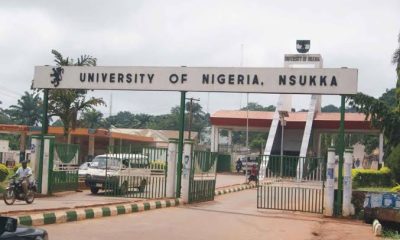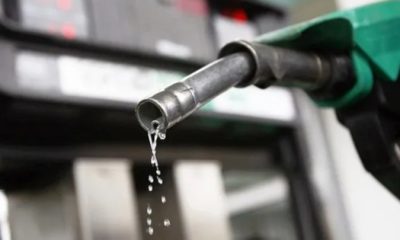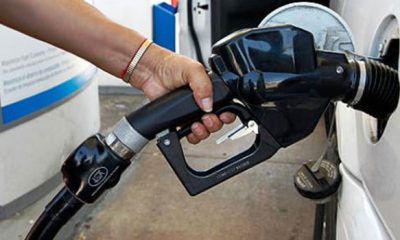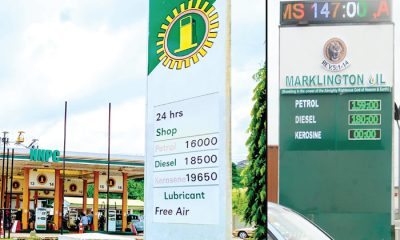Headline
Fuel Price May Fall As Petrol Vessels Berth At Port
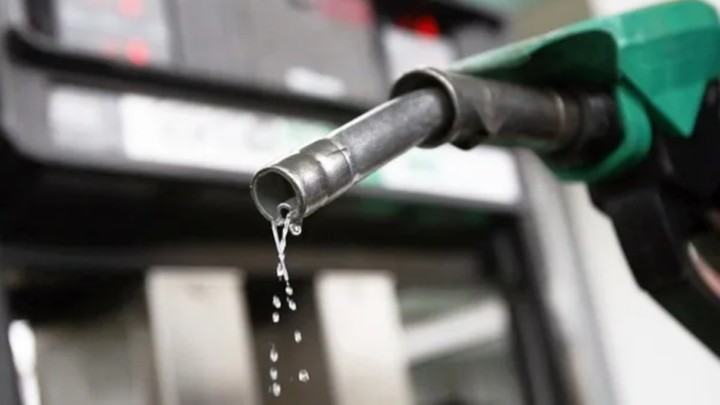
The pump price of Premium Motor Spirit, popularly called petrol, may be reduced in filling stations operated by independent marketers this week, following the massive imports of PMS by the Nigerian National Petroleum Company Limited, oil dealers stated on Saturday.
It was gathered that the recent hike in petrol prices at retail outlets operated by independent marketers was due to the short supply of the commodity, which led to acts of profiteering by both depot owners and filling stations.
But operators in the downstream oil sector confirmed to our correspondent on Saturday night that several cargoes imported by NNPCL had arrived in Nigeria, as some of them were currently discharging at the ports.
“Once the products start hitting filling stations, fuel price will reduce, because the recent high cost was due to supply drop,” the National Public Relations Officer, Independent Petroleum Marketers Association of Nigeria, Chief Ukadike Chinedu, told our correspondent.
On Thursday, oil marketers blamed the emergence of queues for petrol at filling stations in Abuja and neighbouring Nasarawa and Niger states on the low supply of PMS by its sole importer – NNPCL.
However, the national oil company refuted the position of marketers, as it argued that the queues in the affected areas were due to a “price war.”
But going by the latest development concerning the imports by NNPCL, operators in the sector stated that the queues would not only disappear but there would be a reduction in price at independent filling stations.
Currently, petrol is mostly sold at between N580 and N613/litre at filling stations operated by NNPCL. Most other marketers dispense the commodity at higher rates, with some selling PMS for as high as N670/litre.
“The most important thing now is that cargoes carrying PMS ordered by NNPCL have arrived, some of them have berthed and they are discharging. So the partial scarcity we are experiencing now will be gone,” Ukadike said.
He noted that the inflow of foreign exchange during the Yuletide would not necessarily impact petrol prices, rather the increased imports by NNPCL should warrant a reduction in price.
He said the large PMS imports were confirmed to marketers by NNPCL.
On whether marketers had started receiving the products, Ukadike replied, “By Monday we will start receiving from Port Harcourt and Warri, based on my last discussion with the NNPC management.”
Another major marketer also confirmed the position of IPMAN, as he stated that “when you wet the market with products, there’ll be no room for profiteering.”
Earlier, the Chief Corporate Communications Officer, NNPCL, Olufemi Soneye, stated that the position of oil marketers as regards the re-emergence of fuel queues was not true, as he insisted that the oil firm had enough products.
“That is not true. The recent tightness in Abuja is essentially a price war which is typical of any competitive market. Motorists would rather queue at filling stations that offer lower prices than others.
“While NNPC retail is selling at N613/litre in Abuja, other marketers’ prices range from N625-N650/litre,” Soneye said.
Headline
EFCC bars dollar transactions, orders embassies to charge in naira

The Economic and Financial Crimes Commission has barred foreign missions based in Nigeria from transacting in foreign currencies and mandated them to use Naira in their financial businesses.
The EFCC has also mandated Nigerian foreign missions domiciled abroad to accept Naira in their financial businesses.
The anti-graft agency said the move is to tackle the dollarisation of the Nigerian economy and the degradation of the naira
The Commission, therefore, asked the government to stop foreign missions in Nigeria from charging visa and other consular services in foreign denominations.
The EFCC gave the advisory in a letter to the Minister of Foreign Affairs, Amb. Yusuf Tuggar, for onward transmission to all foreign missions in the country.
In the letter, the EFCC said it issued the advisory because the practice of paying for consular services in dollars was in conflict with extant laws and financial regulations in Nigeria.
In a letter dated April 5, 2024, which was addressed to the Minister of Foreign Affairs, Ambassador Yusuf Tuggar, titled: “EFCC Advisory to Foreign Missions against Invoicing in US Dollar,” the EFCC Chairman, Ola Olukoyede expressed dismay over the invoicing of consular services in Nigeria by foreign missions in dollars.
The EFCC cited Section 20(1) of the Central Bank of Nigeria Act, 2007, which makes currencies issued by the apex bank the only legal tender in Nigeria.
The letter read, “I present to you the compliments of the Economic and Financial Crimes Commission, and wish to notify you about the commission’s observation, with dismay, regarding the unhealthy practice by some foreign missions to invoice consular services to Nigerians and other foreign nationals in the country in United States dollar ($).
“It states that ‘the currency notes issued by the Bank shall be the legal tender in Nigeria on their face value for the payment of any amount’.
“This presupposes that any transaction in currencies other than the naira anywhere in Nigeria contravenes the law and is, therefore, illegal.”
The commission further stated that the rejection of the naira for consular services in Nigeria by certain missions, along with non-compliance with foreign exchange regulations in determining service costs, is not just unlawful but also undermines the nation’s sovereignty embodied in its official currency.
The letter continues: “This trend can no longer be tolerated, especially in a volatile economic environment where the country’s macroeconomic policies are constantly under attack by all manner of state and non-state actors.
“In light of the above, you may wish to convey the commission’s displeasure to all missions in Nigeria and restate Nigeria’s desire for their operations not to conflict with extant laws and regulations in the country.”
Diplomatic sources said yesterday, May 10, that some embassies were wondering whether the EFCC’s advisory represented the position of the Federal Government.
Headline
Prince Harry visits sick Nigerian soldiers in Kaduna

Prince Harry and his team visited the 44 Nigerian Army Reference Hospital in Kaduna to interact with wounded soldiers who are receiving treatment.
The Duke of Sussex is in Nigeria with his wife to champion the Invictus Games, which Harry founded to aid the rehabilitation of wounded and sick servicemembers and veterans.
Nigeria joined the Invictus Community of Nations in 2022 becoming the first African country to join.
Prince Harry’s visit to Kaduna came 68 years after his late grandmother Queen Elizabeth II visited the state during the time of the late Premier of Northern Region Sir Ahmadu Bello.




-

 Headline2 days ago
Headline2 days agoSuspend cybersecurity levy– Reps to CBN
-

 Business2 days ago
Business2 days agoNigeria needs over $2bn to revive Ajaokuta Steel Plant, says Minister
-

 Entertainment1 hour ago
Entertainment1 hour agoAMVCA Cultural Day: BBNaija’s Neo, Venita win Best Dressed Male, Female
-

 Metro54 mins ago
Metro54 mins agoEx-Sports Minister laments after hospital neglected him for hours over N80000 deposit
-

 Headline46 mins ago
Headline46 mins agoPrince Harry visits sick Nigerian soldiers in Kaduna
-

 Headline2 days ago
Headline2 days agoTinubu resumes work after foreign trip
-

 News2 days ago
News2 days agoShan George’s money returned to Zenith Bank account

